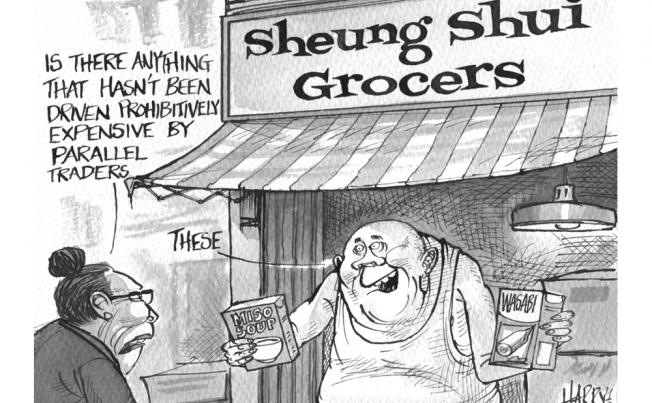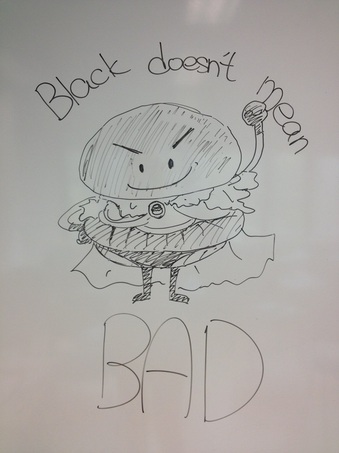I think group five’s poster is the most effective one to promote the black burger because of the good use of slogan and personification.
The group targets on the teenagers and children. For teenagers, they are always curious and want to try new things. Although the black burger is such a fresh and surprising product, some of the teenagers may not be persuaded to have a try because of the unappealing appearance of the burger. Food in dark black colour is usually unpalatable because it seems to be over-cooked. However, the slogan ‘Black doesn’t mean BAD’ just helps to change their mindset and break the stereotype that black food means bad taste. The slogan is short and succinct to draw teenagers’ attention and encourage them to buy the burger.
For children, personifying the burger to be a super hero helps to attract them effectively as the cartoon character is cute. It is quite common for restaurants to link up the food and their own cartoon characters to make the restaurants or food more cute and funny. For example, McDonald’s have Ronald McDonald, Hamburglar to help promote the happy meals and other food. However, it is very creative to personify the burger to be a cartoon character, which other companies have never done. The black burger may not be attractive to children originally. But when it becomes a super hero wearing a cape and a badge which is actually the logo of Burger King, the burger looks more funny and interesting. Besides, the character can also be the icon of the company, representing integrity, kindness. Thus, the image of the company can also be enhanced.
In short, I think the use of slogan and personification is very effective and creative, making the promotion successful.
Gatsby TV Commercial
Do you want to be as charming as Takuya Kimura? Gatsby face wash may help you. This is one of the Gatsby TV advertisements presented in 2010 in many regions, including Japan and Hong Kong, introducing the new series of men’s face wash. Once it was uploaded to YouTube, it became so popular and successfully persuasive to attract people to buy the new products. Why?
A Simple Story
One of the reasons why the ad succeeded is using a simple narration to spread its message to the consumers directly. Unlike other TV commercials of skin care products, this ad does not explain why the products work in a scientific way by describing what powerful chemical ingredients are included. Instead, it only shows that even an ordinary man can be as attractive as Takuya Kimura after using Gatsby face wash, just like telling a short story. On the one hand, it can be easier for the audience to understand the message in a very short time. On the other, using a short story can also help shorten the length of the ad so that advertising expenses can be controlled.
Rhetorical appeal
Instead of using appeal to reason to explain the scientific figures about the products, it adopts appeal to emotion to make it more eye-catching and effective. Positive emotions are raised to give the audience a good impression, for example, beauty and image. Takuya Kimura is such a charming for many Asians, especially for teenagers, because of his good-looking and great acting. Thus, much of the audience may first be attracted by him through watching it and then consider to try the new products.
The Window Effect
Lastly, the widow effect is created through the commercial. It demonstrates in the video how you can be from your ordinary self to your fresh and inspirational self. From a man who looks tricky with a round face and small eyes to a smart and handsome superstar, just by using Gatsby. It may be exaggerative or even unrealistic, but it does not matter because who has never dreamed to be a superstar?
For me, it is not a bad thing to use skin care products to make you look more energetic and beautiful. However, I think inner beauty is also important as it lasts. Besides, everyone is unique so should all of us need to be Takuya Kimura? Why not just be yourself?
Is China Becoming Great?
China has been becoming one of the most fast-developing countries in the world, and having a list of amazing achievements in different areas over the years, like economy, aerospace technology and military. However, all these achievements have reflected the hard power of the country only. How about the real life of the people? Are they living better and happier? Is China really becoming a great country?
Although China is still a developing country now, the economy has been rapidly growing since the economic reforms in 1978. Apart from that, the spacecraft Shenzhou 7 was launched in 2008 and the first space walk for a Chinese astronaut was conducted. The international sport event, Beijing 2008 Olympics Games, was successfully organized by China. Recently, it has completed the construction of the first aircraft carrier, Liaoning. These events all reflected the growing of its hard power which means the military and economic powers.
However, the rights and quality of life of the people seems to be neglected by the government. As predicted, there are still over twenty million of children do not have the education mostly because of money, especially in rural areas. The air quality is worsening in many cities because of the sand storm and pollution of factories. The freedoms of speech, press and assembly are still limited. Many people live under pressure, horror and exploitation, and some of human rights defenders even were persecuted to death, just like Li Wangyang.
Of course, the great achievements of China in terms of economy, technology and military deserve credit. But I think the rights and quality of life are more important than that, as everyone of us should live with dignity and freedoms, including enjoying education, a safe environment and civil rights. To be a truly great and strong country, not only hard power, but a civilized and safe society is also compulsory. I think the government of China still needs to take actions to improve the aforementioned problems, so that people can live better and happily.
Sources:
http://commons.wikimedia.org/wiki/File:Prc1952-2005gdp.gif
http://news.sciencenet.cn/htmlnews//2008/12/214353.html
http://shashinki.com/blog/2008/08/09/the-29th-olympic-games-beijing-olympic-2008-opening-2/
http://blog.eastmoney.com/jinshi095/blog_130950794.html
http://kochapgeography.wikispaces.com/Image+of+the+Day
http://hk.aboluowang.com/2012/1129/271108.html
http://yuming.flnet.org/upload/html/news/mzrq/201206/12-4660.html
 This is a photo taken by a Metro Daily photographer in February last year, while one of the candidates of the Hong Kong Chief Executive election of 2012, Henry Tang, was announcing his platform in the press conference. He was being criticized for his 2400-square-foot illegal basement at 7 York Road, as well as the extramarital affair during the election. ContentOn the one hand, the background of the picture was his slogan for the election – We Are Tomorrow. It showed his aspiration and confidence for becoming a good Chief Executive in the future to unite the whole city. However, on the other hand, he pressed his lips together, showing his anxiety and diffidence when facing the reporters. It showed a big contrast between what his slogan said and how he actually acted. And so it raised people’s confusion about whether he could be a great leader. FramingOnly Tang was captured in the photo, but neither his wife nor any cabinet member was standing beside him. It implied that even his wife did not fully support him as he was involved in an extramarital affair at that time. Moreover, his ability was challenged that no one was willing to work with him. That is why he was alone. AngleThe picture was taken from a low angle that his shoulders were hidden. It is a symbol to suggest that he was irresponsible for what he did as he always denied his illegal basement and the extramarital affair. It intimated that he did not shoulder the blame bravely, but only escaping. In short, different strategies were used by the photographer to imply Henry Tang was not a responsible and capable person to be the Chief Executive of Hong Kong. From: http://www.metrohk.com.hk/index.php?cmd=detail&id=180653
 Can you imagine you can afford to buy nothing at a grocery store? It is not a joke, but seems to be the reality that Sheung Shui residents have encountered for a long time.About the comic This editorial cartoon was drawn by Harry Harrison in September 2012 when the Recovering Sheung Shui Campaign has launched for three months to protest against cross-border parallel trade. In the comic, a housewife looks shocked as only miso soup and wasabi have not been marked up prohibitively at the grocery store in Sheung Shui. However, the grocer is quite happy about that. It is to raise a discussion about the negative impact of cross-border parallel trade on local residents’ daily lives, especially raising the price of groceries. Techniques in the comic Both caricature and exaggeration are used in the comic for different purposes. The facial expressions of the characters are hyperbolized in order to make them look ridiculous and laughable. Having tricky eyes and a big, round face, the grocer is smeared and criticized to be greedy and mean as he can make more money from the parallel trade. Other than caricature, the situation of Sheung Shui is exaggerated as almost everything becomes prohibitively expensive there, so as to show how serious the problem of parallel trade is. Problem of cross-border parallel trade I think the comic is quite persuasive to show the great influence of the parallel trade. In fact, many Hong Kong people get angry about the cross-border parallel traders, especially for those who live in New Territories. Their daily lives are severely annoyed by the parallel traders. Not only daily goods, like milk powder, are snapped up, but the activities of parallel trade also make the MTR stations more and more overcrowding and messy. That is why the government is starting to crack down on these activities, like arresting some parallel traders. Perhaps it is time to review whether we should remain the Individual Visit Scheme since 2003, which indirectly causes the problem of cross-border parallel trade, so that Hong Kong people can regain the original lifestyle. From: http://www.scmp.com/photos/recent/all/1029076
|



 RSS Feed
RSS Feed